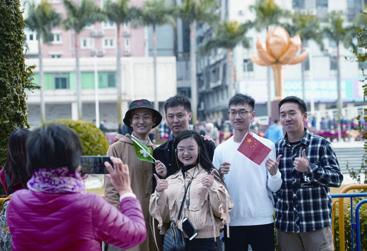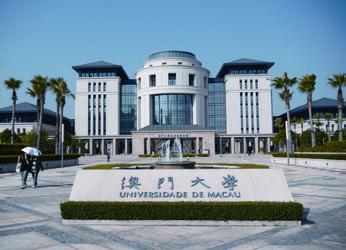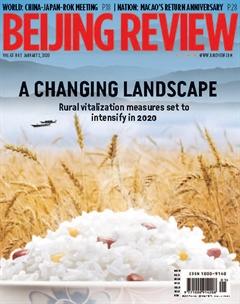Forging Ahead Together
By Ji Jing


The Hou Kong Middle School (HKM) in Macao Special Administrative Region(SAR) has a notable place in history. Founded in 1932, it has the distinction of raising the five-star red flag of the newly founded Peoples Republic of China on October 1, 1949, even though Macao was under Portuguese administration at that time.
The tradition has continued since then with the national flag unfurled every Monday.
This long history has made the school a testament to Macaos patriotic traditions. As part of his itinerary in Macao to join in the celebrations for the 20th anniversary of the regions return to the motherland on December 20, 1999, President Xi Jinping attended a history class at a school affi liated to the HKM at the end of 2019.
There was also a personal reason behind Xis visit to the school. In May 2019, some of the students wrote a letter to him, telling him what they understood about the motherland concept.
“Whenever we have diffi culties, she will open her arms to care for us and protect us. The motherland is our strongest backup,” they wrote.
To their delight, they received an answer from the president, who told them to pass on the tradition of loving the country and loving Macao. Xis letter also encouraged them to study hard to make more contributions to Macao and the cause of national renewal when they grow up.
After watching the students learn about Chinese history and the “one country, two systems” principle, Xi said, “Patriotic education lays a solid social and political foundation for Macao to implement the‘one country, two systems principle and guides its practice to always proceed in the correct direction.”
A unique role
The “one country, two systems” principle was illustrated on December 20, 2019 when a flag-raising ceremony was held at the Golden Lotus Square in Macao with the national fl ag and the fl ag of Macao SAR fl uttering together.
Put forward by the Chinese leadership in the 1980s to promote Chinas peaceful reunifi cation, the principle emphasizes both the Central Governments overall jurisdiction over Hong Kong and Macao SARs and a high degree of autonomy in the two regions.
In his address at the Macao East Asian Games Dome, Xi acknowledged Macaos contribution, saying though small in size, it has played a unique role in upholding the principle. Macao compatriots have supported it, regarding it as the best system to ensure Macaos long-term prosperity and stability. Macao has grasped the opportunities brought by the major national development strategies and integrated with the countrys overall development for its own better development.
“They have a long tradition of patriotism, as well as a strong sense of identity, belonging and national pride, which is the most important reason for the successful practice of ‘one country, two systems in Macao,” he told the gathering. “Patriotic education is well implemented in all kinds of schools, and a sense of national identity and patriotism is deeply rooted in the hearts of Macaos young people.”
“President Xis acknowledgement of Macaos development is bound to encourage Macao compatriots to seize new opportunities and break new ground to promote Macaos sustained economic and social development,” Fu Ziying, Director of the Liaison Office of the Central Peoples Government in Macao SAR, told the media on December 20, 2019.
The gathering saw Ho Iat Seng sworn in as the new chief executive of Macao SAR. Born in Macao in 1957, Ho was president of Macaos Legislative Assembly from 2013 to 2019. In 2019, he took part in the chief executive election as the sole candidate. He was formally appointed Macaos fifthterm chief executive by the State Council, Chinas cabinet, on September 4, 2019.
In his inaugural address, Ho said the new SAR Government will continue to implement “one country, two systems” and follow the national Constitution, and the Basic Law of Macao SAR promulgated in 1993 for the regions governance.

Regarding his shift from president of the Legislative Assembly to chief executive, Ho told Beijing Review in November 2019 that his role had changed from “being the referee to becoming an athlete.”
Growth points
Xi also visited the China-PortugueseSpeaking Countries (PSCs) Commercial and Trade Service Platform Complex. This venue for the regular meetings of Forum Macao, or the Forum for Economic and Trade Cooperation Between China and PSCs (Macao), was launched in 2003 to promote economic and trade cooperation between China and PSCs.
The stint under Portuguese control made Macao bilingual in Chinese and Portuguese and after the reunion, it was positioned as an important platform of commercial and trade exchanges between China and PSCs. Xi called it an important measure to give full play to Macaos strengths to meet the needs of the country.
When the Macao SAR Government started to diversify the economy in 2003, a hurdle it faced was Macaos tiny area and small population. To overcome that, it intensifi ed cooperation and integration with neighboring cities for greater development.
Macao faces Hong Kong across the sea and lies next to Zhuhai, a special economic zone in Guangdong Province in south China, with a narrow river separating it from Hengqin, a nearly 100-square-km island in Zhuhai.
In 2009, the State Council approved a plan to develop Hengqin as a pilot for a new model of cooperation between Guangdong, Hong Kong and Macao. To meet the needs of Macaos economic diversification, Hengqin is focused on the development of technological innovation, finance, healthcare, cultural, tourism and exhibition industries.
Traditional Chinese medicine (TCM) is an industry Macao is promoting to diversify its economy. In 2011, Macao and Guangdong signed an agreement to jointly develop a TCM science and technology industrial park in Hengqin.
There are nearly 160 enterprises operating in the park, covering TCM, healthcare products, medical equipment and biomedicine. Of them, 39 are from Macao.
The park spells more opportunities for Irene Wong King. Wong, who is from Hong Kong, started a TCM company in Macao in 2003. When the Hengqin park opened in 2013, she set up a branch there.
“My healthcare products sell well in Europe because the industrial park can provide test reports which meet European Union standards,” she said. “Such services cant be provided in many other places.”
Across the distance
Integrated growth of the three regions has boosted infrastructure and connectivity. The Lianhua Bridge, the fi rst bridge linking Hengqin with Macao, opened to traffic in 2000, making shuttles more convenient.
Lei Wun Kong, a lawyer from Macao, is one of the regular commuters between Hengqin and Macao. His law firm established a joint venture in Hengqin with counterparts from the mainland and Hong Kong in 2016 and since then, the improved connectivity has made it possible for him to shuttle with ease.
“It takes only half an hour from my fi rm in Macao to reach my Hengqin offi ce,” he said.
It has become increasingly common for Macao people to work in Hengqin and Zhuhai has come up with policies to facilitate their residence on the island. For example, Macao residents who permanently live in Hengqin were given access to basic medical insurance in Zhuhai from July 1, 2019.
The Hong Kong-Zhuhai-Macao Bridge, the longest sea bridge in the world, opened in October 2018, further facilitating transportation. In February 2019, the Guangdong-Hong Kong-Macao Greater Bay Area development plan was unveiled. All this has given Macao greater space for development. The Greater Bay Area comprises Hong Kong, Macao and nine cities in Guangdong.
Macao should grasp the opportunities brought by the Guangdong-Hong KongMacao Greater Bay Area and the Belt and Road Initiative, Xi said at the gathering.
“For now, particularly, efforts should be made in terms of cooperation between Macao and neighboring Zhuhai for the development of Hengqin, which will broaden space and create a new driving force for Macaos long-term development,” he said.
On the night of December 22, 2019, a grand firework show lit up the sky over Macao and Zhuhai in celebration of the 20th anniversary. The show, staged in front of Macao Tower and the Hengqin International Finance Center, was the fi rst large cultural event co-organized by the Macao SAR and Zhuhai governments.

A cluster of 600 unmanned drones formed the shapes of the Hong KongZhuhai-Macao Bridge, Macaos iconic Ruins of St. Pauls as well as the slogan“Zhuhai and Macao are one family” during the show, which was undertaken by the Macao Government Tourism Offi ce and the Administrative Committee of Hengqin New Area.
The show aimed to highlight the importance of cultural bonds between Zhuhai and Macao, Yang Chuan, Director of the Hengqin New Area Administrative Committee, said.
A Successful Practice
The University of Macao (UM), the only comprehensive public university in Macao, had just a 0.05-square-km campus when it was founded in 1981.
After Macaos return, the regional government sought policy support from the Central Government to build a world-class university.
In 2009, the National Peoples Congress, Chinas national legislature, approved the universitys request to build a new campus on Hengqin Island. The new sprawling campus, 20 times larger than the original one, was opened in 2013. It can accommodate over 10,000 students.
“Although the campus is located in Hengqin, it follows the law of Macao SAR, which is a vivid example of the innovative implementation of ‘one country, two systems in Macao,” Yonghua Song, Rector of the UM, told Peoples Daily. “The new campus has laid a solid foundation for the university to become a globally competitive higher learning and research institution.”
Today, the university has four major laboratories, one of which is for traditional Chinese medicine, jointly established with the Macao University of Science and Technology.

